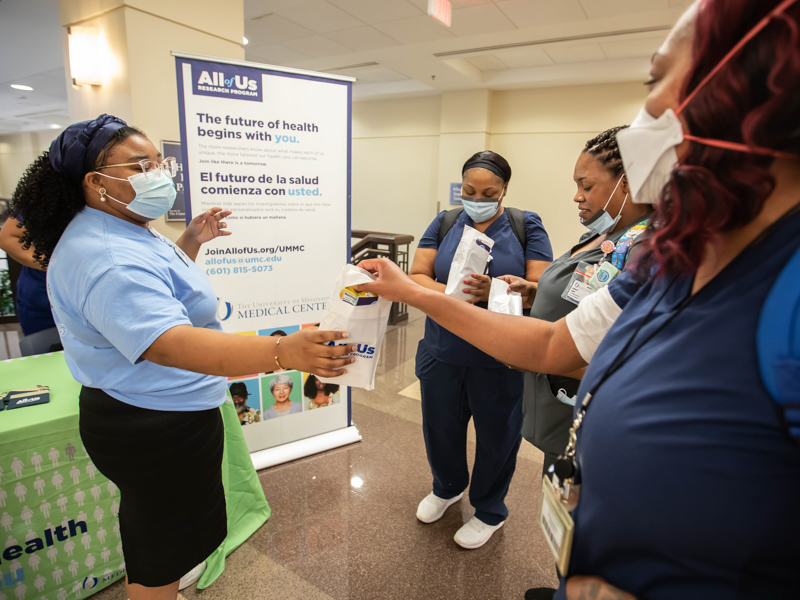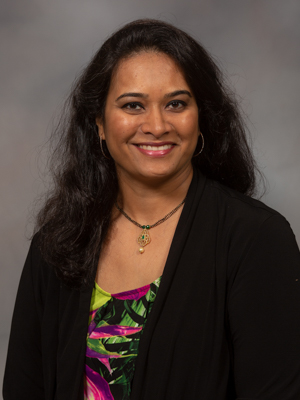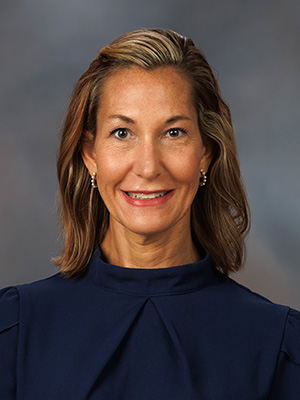Study aims to improve health for All of Us

The answers to some of the biggest questions facing medicine and health won’t come from an individual, a lab, or even a whole university. It’s going to take All of Us.
The University of Mississippi Medical Center is an enrollment site of the All of Us Research Program, a National Institutes of Health initiative to collect health information from 1 million Americans. Its goal is to create one of the largest, most diverse datasets in history, allowing scientists to study all of the factors that influence health and accelerate progress towards preventing, treating and curing diseases.

Dr. Gouri Mahajan, co-principal investigator for UMMC’s All of Us site, said that one of the study’s main goals is advance precision medicine: “medicine that works explicitly for that patient,” she said.
“In medicine, we see that one size does not fit all,” said Mahajan, the director of the UMMC Biobank.
For instance, hypertension is one of the most common health conditions in adults. Habits, genetics and the presence of other diseases all affect the risk of developing high blood pressure. It also has a myriad of treatments, from diet and exercise to dozens of approved medications. A doctor and patient could go through rounds of interventions, trying to find one that works. Precision medicine can take out the guesswork, save a patient’s time and well-being, and identify the best treatment first.
The size of All of Us also allows researchers to ask and answer meaningful questions about common and rare health conditions and their relationship to genetics. All of Us seeks to advance pharmacogenetics, the understanding of how and individual’s DNA influences a drug’s effectiveness. In practice, this could mean a patient “receiving a list of drugs that might be best for their condition,” when many options are available, Mahajan said.
Mahajan became co-PI of UMMC’s All of Us study site January 2022. She also leads UMMC’s separate biobanking and precision medicine-oriented study in collaboration with Mayo Clinic, Biobank Mississippi. Dr. Richard Summers, associate vice chancellor for research, is the other Co-PI for UMMC’s All of Us site.
The NIH announced All of Us in 2015 and started enrolling participants in 2018. Intended to run for at least 10 years, the study has enrolled 500,000 people nationally. About 340,000 of them have provided their data and specimens. UMMC has enrolled more than 2800 people through its Jackson-based sites and hopes to reach their goal of 3,935 by 2023.
UMMC’s original plan was to enroll about 9,300 people, or 10 percent of the University of Alabama at Birmingham-led Southern All of Us Network goal. Thanks to good planning and strong support from the NIH, UMMC was making decent progress, until COVID-19.

“Nobody counted on a pandemic,” said Kristi Cofer, manager of operations for All of Us at UMMC.
Visitor restrictions hampered national recruitment efforts and made it harder to enroll participants and collect specimens. Now, UMMC and other participating groups are ramping up recruitment once again.
To reach their goals, the UMMC team has hired participant recruiters and other staff to work at information tables and the study’s clinical sites at the Jackson Medical Mall and the Outpatient Clinical Research Unit in the University Rehabilitation Center.
Participants can register and consent to All of Us fully online though a website or a mobile app. The process takes “up to one hour,” Cofer said.
During the 20-minute physical appointment, participants have their height, weight, waist, hips and blood pressure measured. They also provide urine and blood samples, which researchers can use to measure biomarkers like glucose or protein levels. The blood is also a source of DNA, which can reveal if a person has genetic variants that change their risk for cardiovascular disease, cancer or other conditions.
“Blood is a mirror for health,” Mahajan said.
Using the All of Us website, participants provide information about their personal and family medical history, habits, and environment.
One of the ways the study engages participants is by making their health data available for personal viewing and use. For example, participants can choose if they want to receive data back from the study about their genetics or if they want to share it with their physician.
“If you’re flagged in the genetic screen [for a variant that may affect your health] and you have consented to sharing your data, participants have the option of sharing their study results with their preferred provider to create a more specific approach to their healthcare,” Cofer said.
Earlier this year, the NIH announced that nearly 100,000 whole genome sequences collected through All of Us are available for researchers. About half of these come from people who are members of ethnic or racial minority groups.
Mahajan says All of Us’ commitment to participant diversity makes UMMC a valuable recruitment site. The Medical Center’s patient population includes more rural, low-income and non-white patients than other research-oriented hospitals, which makes it easier to recruit a diverse cohort representing groups with historically low participation in clinical research studies.
Regardless of demographics, “Sometimes people run away from the prospect of being in a research study,” Mahajan said. “They ask, ‘What is the government going to do with the data?’”
While the health data collected through All of Us puts a high focus on data security. The scientists who access this data for research cannot see participants’ names or other personally identifying information. Participants can opt-in to a consent process that shares information collected through the exam and questionnaire with your physician.
“The participant’s information is private until they choose to share,” Cofer said.
In terms of recruitment, “We’re really focused on reaching UMMC employees and students,” Mahajan said, not only as participants, but also as ambassadors. “We’d also like to get more physician involvement and use that physician-patient trust to build awareness of the study.”
The team is planning lunch and learn sessions to increase knowledge of the study across campus. Cofer said that All of Us is working on building a presence at community health centers, health fairs and UMMC-affiliated clinics across Mississippi to reach more potential participants.
While the personal time commitment for participants is short, the size and scope of the study mean that tangible results will be years, if not decades, away.
The All of Us Research Program is open to people 18 or older living in the United States. For details or to enroll, go to https://allofus.nih.gov/ or call (601) 815-5073.


